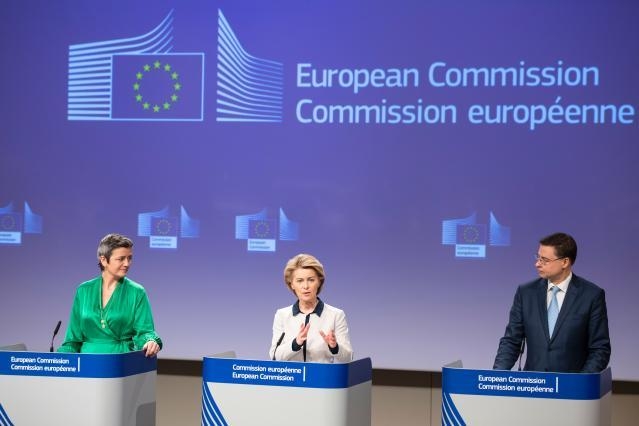
It isn’t just the pandemic we are discussing, although it is at the forefront of our minds as efforts for mitigation are unequal and only somewhat effective. We are, and must, also discuss the post-pandemic world and in that, a conversation has already been blooming faster than cherry blossoms on this incredibly warm confined April: the bell would be, unbeknownst to most but clear to opinion writers, toll on the European Union.
All of those pieces have one thing in common: the European Union, which was, according to some, on its last wobbly legs due to the rise of far right populism in some of its member states, and according to others, in an unprecedented position to take the lead on domestic and international affairs, has collapsed not because of its economy (that has collapsed worldwide), but because of…
Nationalism on the time of coronavirus (The Guardian), the lack of a fiscal union (the Guardian again), individualism instead of solidarity (Carnegie), “complacency, overconfidence and a lack of preparation” (Politico), lack of debt-sharing(BBC), and I could go on. From those, we can identify what the real problems have been in the coordinated EU response, but why it is premature, and even dangerous, to call a time of death on the transnational institution.

I – The Commission response
Just like in every other area of the European Union policy, access to decisions is easy and transparent, but communication itself remains a weak point. The whole coronavirus coordinated response can be found here, and sadly is lacking, at this point, a consensus on the “coronabonds”, or bailouts, between member-states. If a commentator is surprised that common finance is a sore subject amongst member-states, I’m not sure this blog will be enough. The argument, however, that the urgency requires to set some old grudges aside or to play the sovereignty card is entirely valid.
A – the response: coordinated, common, and concerted
One of the main criticisms in the aforementioned pieces concerned the timing of the response, but this is not strictly limited to the EU. All member-states are criticized for having enacted shelter in place or other forms of lockdowns too late, according to some, but the reality is that no legal measure could be undertaken without the base footing of scientific certainty. The timeline of the EU response can be found here, with the note that most measures with regards to public health were initially left in the sovereign domain, until it was EU transnationalism and solidarity that was asked to be triggered in the face of dangerous economic recession and the possible danger posed by free movement.
This timeline starts on 9 January and concerns information-sharing between member states regarding the state of a health crisis. This is much sooner than most commentators would have expected, when the first Council of Ministers made a public decision to close the external borders and implement green lanes. The first official meeting on the impact of the coronavirus was on 17 January. By 31 January, funds were allocated to research; on 28 February, started the joint procurement meetings. The temporary framework to assist economies that would face a recession dates from March. It is unclear as to whether the criticism that the EU did not respond appropriately to the crisis, from containment of freedom of movement to supporting member states’ decisions to bail out small businesses can be an indicator of failure.
What could make or break the EU’s image in the collective consciousness however is whether or not the EU, led by its strongest economies – for what it’s worth, France, supposed to be one of the triad, now has a national debt of 122% and is in a recession – can summon the political will to make the economic union work. Beyond that, the Eurogroup and other member states will have to understand this is but one piece in a much bigger puzzle: free flow of medical equipment and personnel; repatriation of infected expats; transfer of patients from saturated member states; joint procurement funds; border control; seizure of essential personnel and manufacturers; etc. While we focus on what the EU can do for us, we much too often think about it in terms of economic needs, while it can also be a marker of whether or not there can be any form of internationalism and global solidarity projects at a time of a global crisis that doesn’t simply affects markets, but affects human sustainability.
B- the pressure of economic sustainability
Once again, it is over the inequalities between member-states and their respective capacities to withstand a crisis that makes the EU both necessary and in a deadlock to find a response. When Italy asked for further financial assistance, beyond the 500billion eur envelope that will finally not see the light (yet), it faced opposition from other member-states. Italy has suffered the highest death toll of the pandemic since the beginning; in response, the country, currently governed by the far-right, upped the Euroscepticism ante. The Commission response rang a little hollow still. This is far from being the first time that member-states butt heads over financially assisting one specific other, but the issue is whether the EU Council and/or the EU Commission will be able to force consensus at a time when it is the only option.
Maintaining salaries, health care coverage, and businesses thriving is absolutely crucial if we want to wake up from this nightmare in a post-pandemic world that has a hope of normalcy. After months and months of containment, with its slew of human rights issues that have already started to make their way to international courts, states have to answer to the welfare of their citizens – and public health is a sovereign domain, that is not relegated to the EU. Many legal commentators much more qualified than this one have however agreed that any form of legal, political, and economic sustainability would have to come from coordination, cooperation and communication; but the issue remains financial before it is addressed as a human threat, something the EU should reframe as soon as possible if it does not want to leave the battleground to more traditionally politically inclined institutions such as the Council of Europe or the General Assembly. This is far more important than goods – but if there is any form of solidarity in transnationalism, it’s because we have the capacity to address each other’s concerns in a way that is not isolationist. This is a debate that predates the pandemic, and that has plagued the EU since its inception.

II – Why the EU matters in time of crisis
Several conferences have highlighted the inescapable fact that there are only two ways the post-pandemic world could be shaped: either by a continuous rise of the authoritarian trend we’ve seen attacking globally and targeting by weakening our institutions, or by immediate action on the part of human rights defenders to protect, strengthen, and ensure that the rule of law will perdure and last. The European Union is not just a fiscal or economic union that is to be relied on times of crisis; it is a political and legal structure that also has a choice, within its own executive bodies, to decide to give in on populist criticism or to stand up for a future in which it will have a supported place.
A – Because it can fail, and has to be held accountable
Maintaining salaries, health care coverage, and businesses thriving is absolutely crucial if we want to wake up from this nightmare in a post-pandemic world that has a hope of normalcy. After months and months of containment, with its slew of human rights issues that have already started to make their way to international courts, states have to answer to the welfare of their citizens – and public health is a sovereign domain, that is not relegated to the EU. Many legal commentators much more qualified than this one have however agreed that any form of legal, political, and economic sustainability would have to come from coordination, cooperation and communication; but the issue remain financial before it is addressed as a human threat, something the EU should reframe as soon as possible if it does not want to leave the battleground to more traditionally politically inclined institutions such as the Council of Europe or the General Assembly. This is far more important than goods – but if there is any form of solidarity in transnationalism, it’s because we have the capacity to address each other’s concerns in a way that is not isolationist. This is a debate that predates the pandemic, and that has plagued the EU since its inception.
B – Because this accountability matters in a world with none
I know long time readers will see this as yet another display of my EU blue bleeding heart, but this is in fact in moments of crisis that we can test, as informed citizens and activists, whether institutions are strong enough to withstand such a trying time. The EU was built on rubble; it has faced many crisis over the course of its existence already; the question is why a global one would be its downfall. The virus has, indeed, so far mainly affected global north countries, and two EU countries more specifically in Spain and Italy. But this does not mean the EU does not have the means to respond; what it does is try to arm member states with the tools, information, and resources to respond in their own ways and coordinate as much as possible.
An open letter, signed by 80 MEPs and relayed by NGO Access Info, has demanded that the Commission takes a closer look at the measures enacted by government under pandemic responses that could amount to violations of human rights – and this is absolutely crucial that not only we, as activists, lawyers, defenders, and citizens, remain vigilant, but that we can trust our institutions to do the same. Criticism of the EU because it does not reach the agreements with need is welcome and transparent; but we can not remove the responsibility of member-states in this lack of agreement, with the usual fractures of northern European countries footing the bill for the southern ones. Transnationalism should be based on principles of solidarity, and if we all agree that mitigation takes priority over accountability right now, the Commission must act, protect Italy, France, and Spain; offer a bridge to the United Kingdom; and press Germany, the Netherlands and Sweden for the political will to save a country such as Italy, already battling its domestic demons.